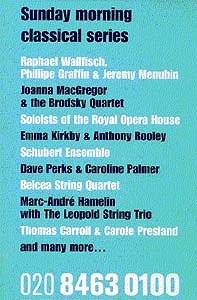
Blackheath Sundays are in full swing with an
impressive list of bookings through to May. The Royal Opera House Orchestra
has been diversifying its activities, with a versatile ensemble of principals
from the orchestra giving concerts and taking part in educational work. Their
standard is commendably high and the first of their two morning programmes
at Blackheath this year put a modern rarity together with the best loved
of all piano quintets.
Alfred Schnittke (1934-98) endured appalling ill health in his latter years, but went on composing even after a series of severe strokes. As thanks to a doctor who "was twice responsible for saving his life", he arranged his dramatic string trio for piano trio, and this proved a valuable new addition to the repertoire of the Soloists of the ROH. The original (1985) is a tour de force, which stretches the string trio medium to near bursting. Recomposed with piano instead of viola, the 1992 reworking becomes a very different, but equally compelling and disturbing piece, its two movements both opposing Schnittke's characteristic sudden juxtapositions of cluster chords and grating dissonances with consoling passages of calm beauty, which bothered some members of the audience, "hot and cold" complained one listener. The performance by Tim Carey (piano), Peter Manning (violin) and Christopher Vanderspar (cello) was notable for perfect balance and equally perfect intonation, important in music for which the dissonances are as precisely calculated as the comforting consonances. [There are five CD recordings available of Schnittke's string trio, but none in the catalogue of the piano trio version.]There were complaints that the Wigmore Hall had chosen pessimistic, dark music of Schubert's final year for its last concert of the last century (see review in S&H, December 1999) so it was appropriate that the Soloists of the Royal Opera House greeted 2000 with the Trout Quintet, the happiest piece in the chamber music canon. The three players above were joined by Stephen Broom (viola) and Tony Hougham (sonorous double bass) and impeccable standards were upheld in a piece which needs all its elements in balance.
The brunt falls upon the pianist, whose part often ripples in high register octaves, and upon the violinist leader, whose part is notably difficult (as is that of the Octet) and requires endurance to preserve tone and intonation in long stretches of high passage work. Peter Manning coped with complete aplomb and Tim Carey seemed entirely happy with the Blackheath Bösendorfer, which had caused problems for Jeremy Menuhin the week before.They tended to maintain a rather steady pulse, concentrating instead on balance & tone quality, and my only reservation was to wonder whether a little more bending, a touch of rubato, might have been suitable for some of this endearing music? But modern fashion is against 'pulling around' the rhythm for 'expression', which used to be so common, and this does not amount to a serious criticism of a well thought out and executed performance which left listeners well satisfied, with just the right feeling before Sunday dinner.
Peter Grahame Woolf
[The Soloists of the ROH have recorded the Trout Quintet for BMG/Conifer, released 1997]

 Return to:
Return to: